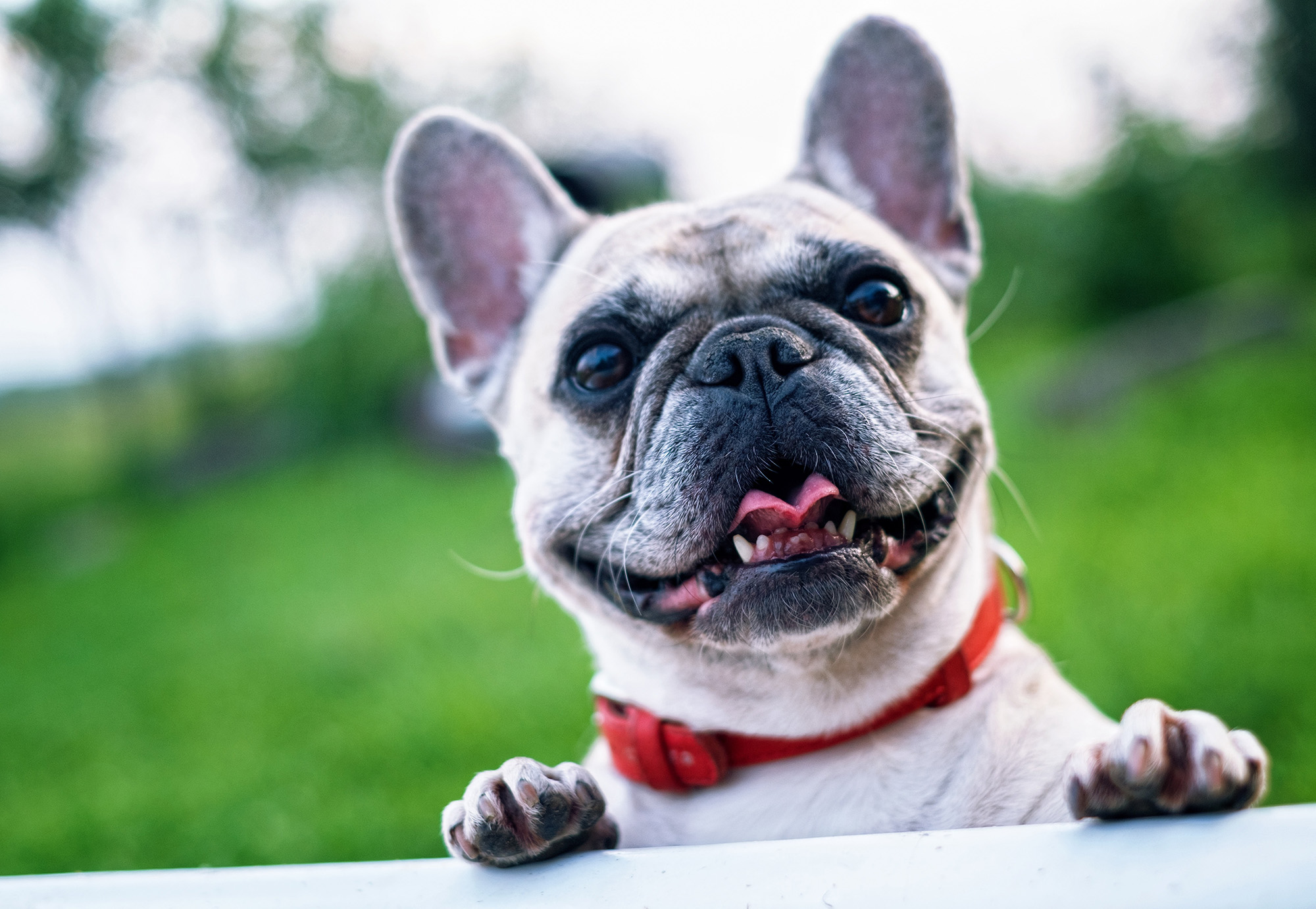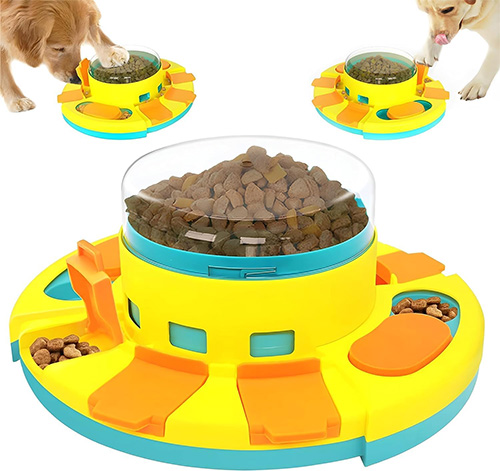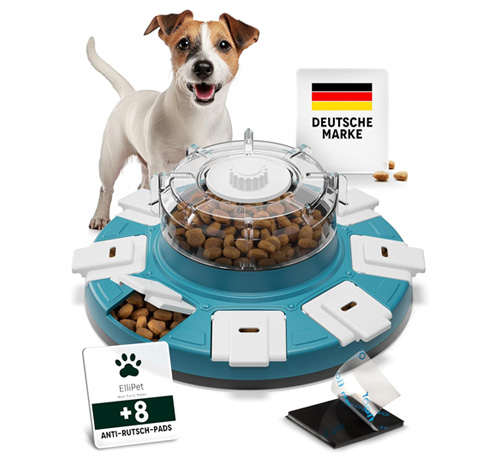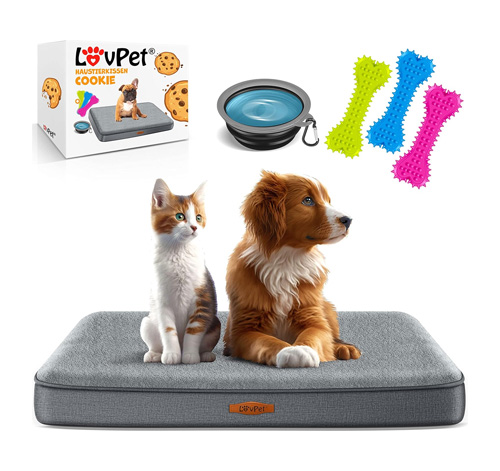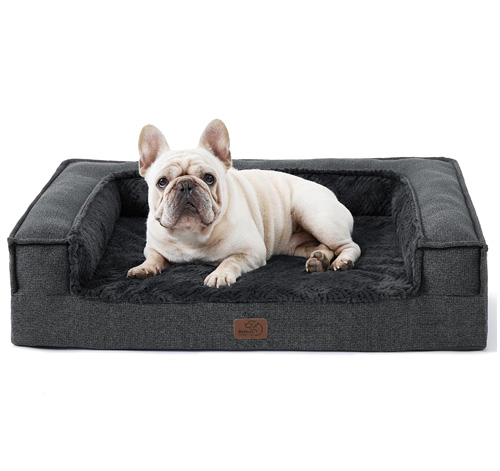French Bulldogs have captured the hearts of many dog lovers with their playful personalities, affectionate nature, and unique physical features. It’s no wonder they are one of the most popular dog breeds in the world. If you’re considering bringing a French Bulldog into your home, it’s important to know their history, characteristics and special care requirements. In this comprehensive guide, you’ll learn everything you need to know about living well with a French Bulldog.
Understanding the French Bulldog Breed
French Bulldogs, classified as a “non-sporting” dog by the American Kennel Club (AKC), are compact, muscular dogs with distinctive features. Standing at 11-13 inches tall and weighing up to 28 pounds, these dogs have large heads, expressive wrinkled faces, flat noses, and prominent eyes. One of their most recognizable traits is their enormous bat-like ears. French Bulldogs come in a variety of colors, including brindle, cream, fawn, black and spotted (spotted mixtures of the approved colors).
The Playful Personality of the French Bulldog
French Bulldogs are known for their friendly and affectionate nature. They are true companion dogs and love to play and cuddle with their loved ones. When their loved ones come home, they often become extremely excited and display their joy with their signature “wiggle-butt” dance. While they may make a lot of noise with their snorting, snoring, wheezing, and farting, French Bulldogs are not known to be excessive barkers. They are generally dog- and kid-friendly, although some may have a high prey drive and require proper training to interact with cats or other small animals.
French Bulldogs make excellent apartment dogs due to their small size and moderate exercise needs. They enjoy going for walks and are naturally curious, making them great companions for people-watching. These dogs are incredibly loyal and prefer to stick by their human’s side, which is why they were bred to be human-centric. However, their brachycephalic (short-headed) anatomy limits their ability to join in on more strenuous activities like running or hiking. French Bulldogs are prone to overheating, so it’s important to keep them cool and avoid overexertion, particularly in warm weather.

A Brief History of the French Bulldog
The French Bulldog’s history traces back to an earlier version of the English Bulldog. When English lacemakers moved to Normandy in the 19th century, they brought their undersized Bulldogs with them. These Bulldogs, considered too small or not meeting breeding standards, were bred with local ratting terriers in France, giving rise to the French Bulldog. The breed quickly gained popularity among both royalty and everyday people, including artists like Henri de Toulouse-Lautrec. French Bulldogs made their way to America near the end of the 19th century and were officially recognized by the AKC in 1898.
Shop intelligence Frenchie toys
Over time, the French Bulldog’s appearance has evolved. While the original French Bulldogs resembled Boston Terriers, today’s Frenchies have a shorter and wider build, along with a flatter snout. Due to their unique anatomy, the majority of breeding French Bulldogs require artificial insemination, and Cesarean sections are common during the birthing process. Despite these challenges, the popularity of French Bulldogs continues to grow, leading to an increase in breeders. When looking for a French Bulldog, it’s essential to choose a reputable breeder who conducts genetic and health testing and prioritizes responsible breeding practices.
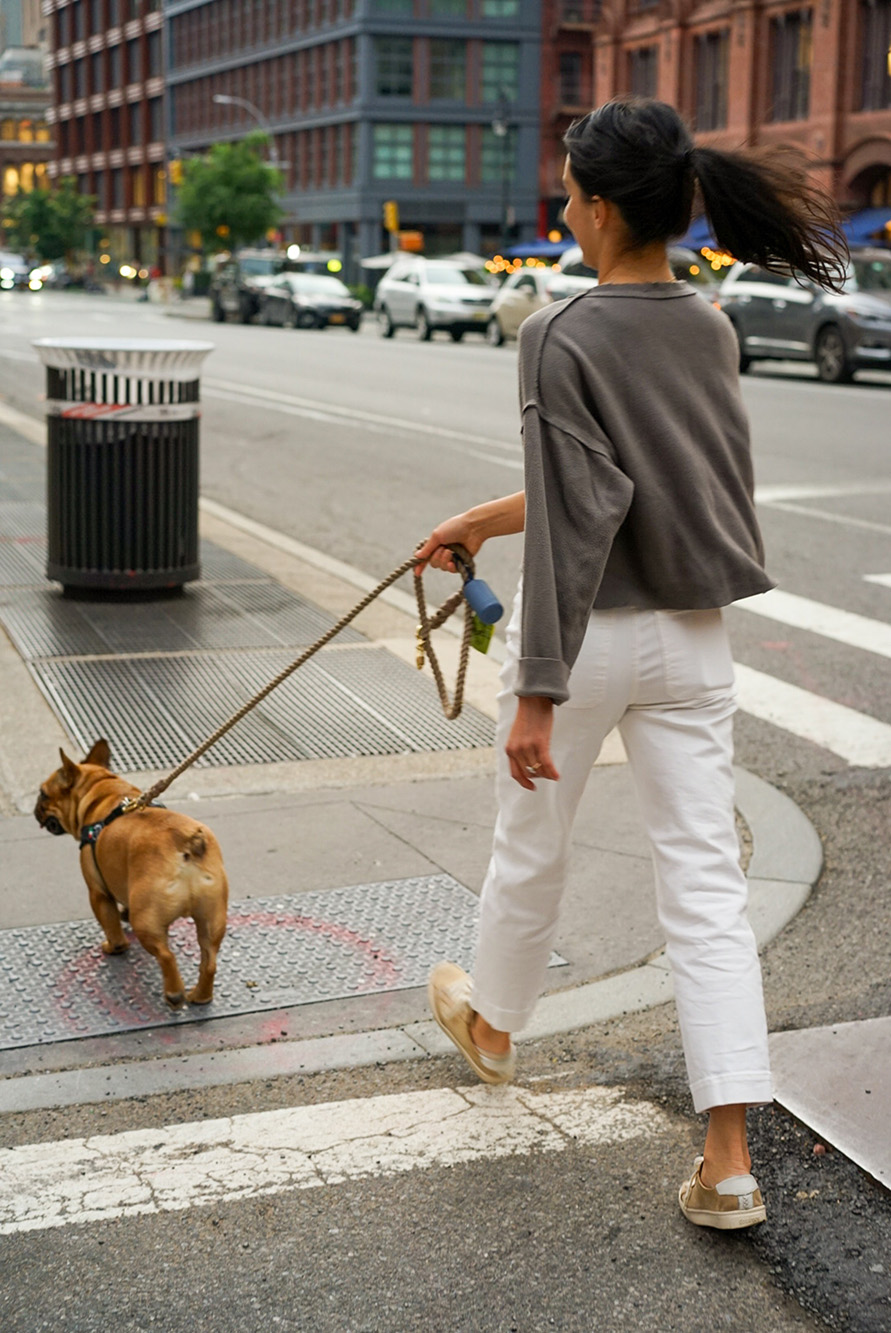
Preparations for your French Bulldog
Welcoming a French Bulldog into your home requires careful preparation to ensure their well-being and happiness. Here are some important steps you should take before welcoming your new furry friend:
- Research and learn:
Take the time to learn about the breed’s characteristics, temperament and special care needs. Knowing their characteristics and possible health problems will help you to provide your French Bulldog with the best possible care. - Look for a reputable breeder or animal shelter:
If you decide to buy a French Bulldog from a breeder, be sure to choose a reputable breeder who prioritizes the health and well-being of their dogs. Ask about genetic and health tests, certifications and the breeder’s experience. Alternatively, you could also adopt a French Bulldog from an animal shelter, as there are often dogs of this breed in need of a loving home. - Prepare your home:
French Bulldogs are well suited to living in an apartment, but still need a safe and comfortable environment. Puppy-proof your home by removing all potential hazards and making sure your living space is suitable for a small dog. Provide cozy bedding, toys and a dedicated area for your Frenchie. - Buy the most important utensils:
Before your French Bulldog moves in with you, you should stock up on essentials such as food and water bowls, a comfortable crate or bed, good quality dog food, grooming utensils and suitable toys. If you have these things ready, your French Bulldog will have no trouble settling into its new home. - Make an appointment with your vet:
Make an appointment with your vet as soon as possible to get to know each other. Your vet will carry out a thorough health check, give the necessary vaccinations and discuss preventative measures, nutrition and breed-specific health problems.
If you take these preparatory steps, you will be well prepared to offer your French Bulldog a loving and safe home.
Shop cozy Frenchie beds

French Bulldog Care Essentials
French Bulldogs have specific care needs that contribute to their overall well-being. From grooming to dental care, here are the essential aspects of French Bulldog care:
- Grooming:
French Bulldogs have a short and smooth coat that requires minimal grooming. Regular brushing helps remove loose hair and keeps their coat healthy. Take special care to clean their facial wrinkles to avoid skin problems. Also make sure you maintain good nail hygiene by cutting your nails regularly or seeking professional help. - Dental care:
Oral hygiene is very important for French Bulldogs as they are prone to dental problems. Establish a regular dental care routine, including brushing their teeth with a dog-friendly toothpaste and providing chews or toys to promote dental health. - Bathing:
Although French Bulldogs generally don’t need to be bathed frequently, a regular bath is necessary to keep their skin and coat clean. Use a gentle dog shampoo and ensure thorough drying to avoid skin irritation. - Eye and ear care:
The French Bulldog’s protruding eyes and narrow ear canals make them more prone to eye and ear problems. Clean their eyes regularly with a damp cloth and see a vet if you notice any signs of infection or discomfort. Use a vet-approved ear cleaner to clean the ears and gently wipe the outer ear to prevent the build-up of bacteria and yeast. - Feeding and nutrition:
The right diet is crucial for the health and well-being of your French Bulldog. Choose a high-quality dog food that meets their nutritional needs. Fresh food diets can help address digestive issues and allergies commonly experienced by French Bulldogs. - Hydration:
Make sure your French Bulldog has access to fresh, clean water at all times. Proper hydration is crucial for their overall health, especially during hot weather or periods of physical activity. - Regular veterinary check-ups:
Schedule regular check-ups with your veterinarian to monitor your French Bulldog’s health. Regular vaccinations, preventive treatments for fleas and ticks, and discussions about specific health concerns will help ensure your Frenchie’s well-being.
If you follow these basic care measures, you can give your French Bulldog a happy and healthy life.
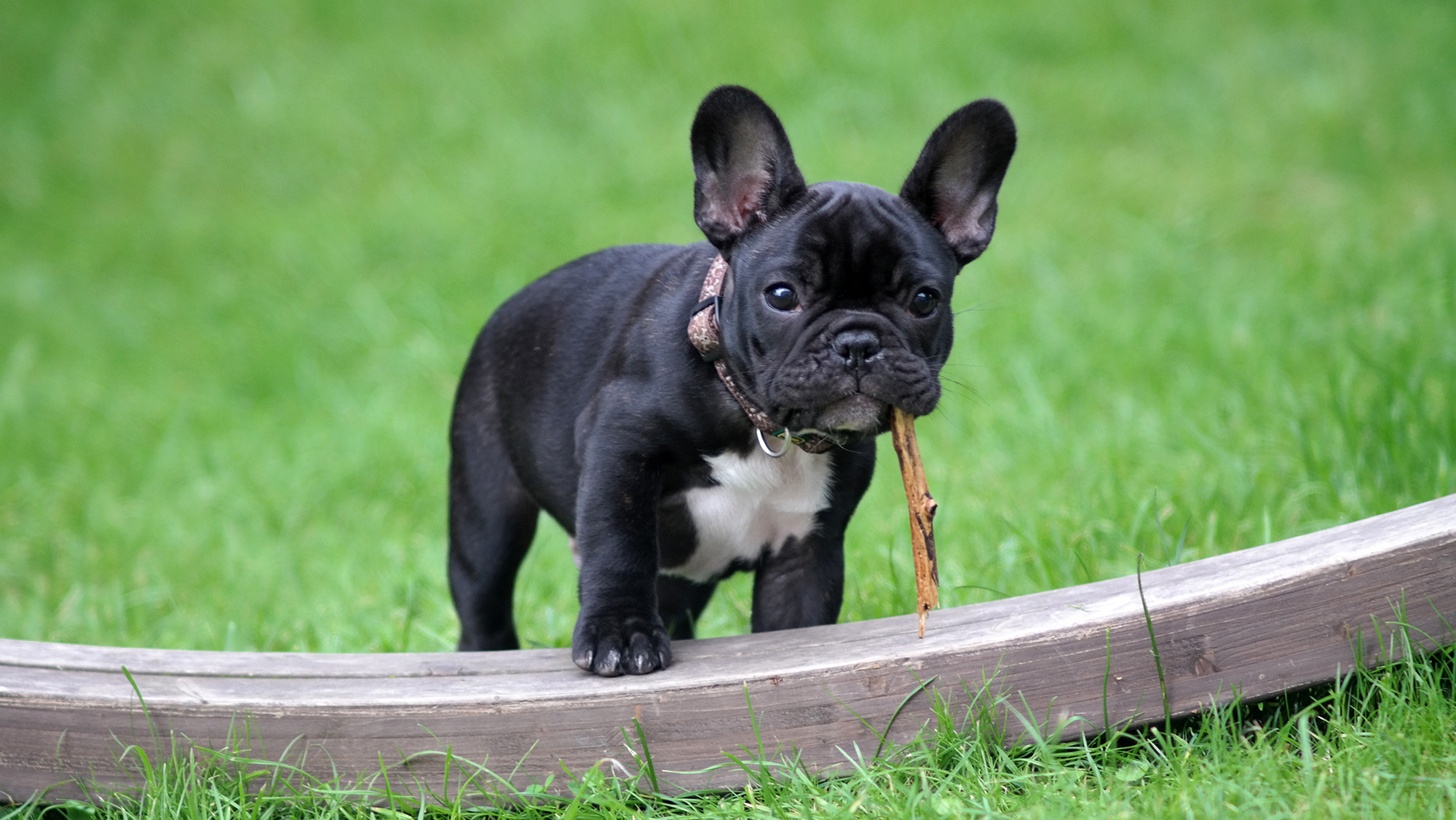
Training and Socialization
French Bulldogs are intelligent but can also be stubborn. Early socialization and consistent training are essential to ensure they become well-behaved and obedient companions. Here are some tips for training and socializing your French Bulldog:
- Start early:
Start training and socialization as early as possible. Introduce your Frenchie to different people, animals and situations to help him develop positive associations and good behavior. - Consistency is key:
French Bulldogs can be willful, so a consistent training method and expectation is crucial. Set clear boundaries and consistently encourage positive behavior. - Use positive reinforcement:
Reward-based training techniques such as treats, praise and play work well with French Bulldogs. Positive reinforcement encourages them to repeat desired behaviors. - Basic commands:
Teach your Frenchie basic commands such as sit, stay, come and leave it. These commands will help establish control and ensure their safety in various situations. - Avoid begging and food scraps:
French Bulldogs tend to beg for food and attention. Do not give in to these demands as this can lead to unwanted behaviors and weight gain. Teach them to wait quietly during mealtimes and avoid sharing leftovers with others. - Ongoing training:
Training should be an ongoing process throughout your French Bulldog’s life. Regular practice, reinforcement and mental stimulation will help maintain good behavior and strengthen the bond between you and your Frenchie.
By investing time and effort in training and socialization, you will ensure that your French Bulldog grows up to be a well-mannered and happy companion.

Exercise and Mental Stimulation
While French Bulldogs are not high-energy dogs, they still require regular exercise and mental stimulation to stay healthy and happy. Below you will find some guidelines for exercise and mental stimulation for your Frenchie:
Shop interactive Frenchie toys
- Daily walks:
Walk your French Bulldog daily to exercise them physically and stimulate them mentally. Aim for at least 60 minutes of exercise per day, broken up into shorter walks to avoid overexertion. - Low intensity activities:
French Bulldogs are not suitable for intense physical activities due to their brachycephalic anatomy. Therefore, avoid activities that can lead to overheating or breathing difficulties. Instead, perform low-intensity exercise, such as gentle play sessions or indoor games. - Interactive toy:
Give your Frenchie interactive toys to stimulate his mind and keep him entertained. Puzzle toys and treat-dispensing toys can provide mental stimulation and help prevent boredom. - Training games:
Incorporate training games into your Frenchie’s training program. Use commands and tricks to challenge their mental abilities and keep them physically active at the same time. - Mental enrichment:
Encourage your French Bulldog’s mind through activities such as obedience training, tracking or simple agility exercises. Mental enrichment is just as important as physical exercise for their overall well-being. - Avoid extreme temperatures:
French Bulldogs are sensitive to extreme temperatures. Avoid exercising them during peak heat periods and provide them with a cool and comfortable environment, especially in hot weather.
By incorporating regular exercise and mental stimulation into your French Bulldog’s daily routine, you will help them to maintain a healthy body and an active mind.

Traveling and French Bulldogs
Traveling with your French Bulldog requires careful planning to ensure their safety and comfort. Whether it’s a short trip or a long journey, here are some tips for traveling with your Frenchie:
- Use a safe transport box:
If you are traveling by car, use a secure and well-ventilated carrier or crate to transport your French Bulldog in safety. Make sure the crate is large enough for your dog to stand, turn around and lie down comfortably. - Take breaks:
Take regular breaks on long car journeys so your Frenchie can stretch their legs and relieve themselves. Provide access to water and make sure they don’t overheat during stops. - Considerations for air travel:
If you are planning to travel by air, find out about the airline’s specific requirements for taking pets with you. Some airlines have restrictions on brachycephalic breeds due to their respiratory concerns. Follow all necessary procedures and ensure the well-being of your Frenchie during the flight. - Pack the essentials:
Bring essentials like food, water, treats, familiar bedding and any necessary medications. These items will make your Frenchie feel more comfortable and secure during the trip. - Accommodation considerations:
When booking accommodation, make sure it is pet-friendly and has suitable facilities for your French Bulldog. Familiarize yourself with the specific rules and restrictions for pets. - Plan for air-conditioned conditions:
Consider the climatic conditions at your destination and take the appropriate precautions to keep your Frenchie comfortable. Extreme temperatures can be dangerous for brachycephalic breeds. Therefore, take precautions to avoid overheating or exposure to cold.
Shop sensitive Frenchie food
With proper planning and preparation, traveling with your French Bulldog can be a positive and enjoyable experience for both of you.
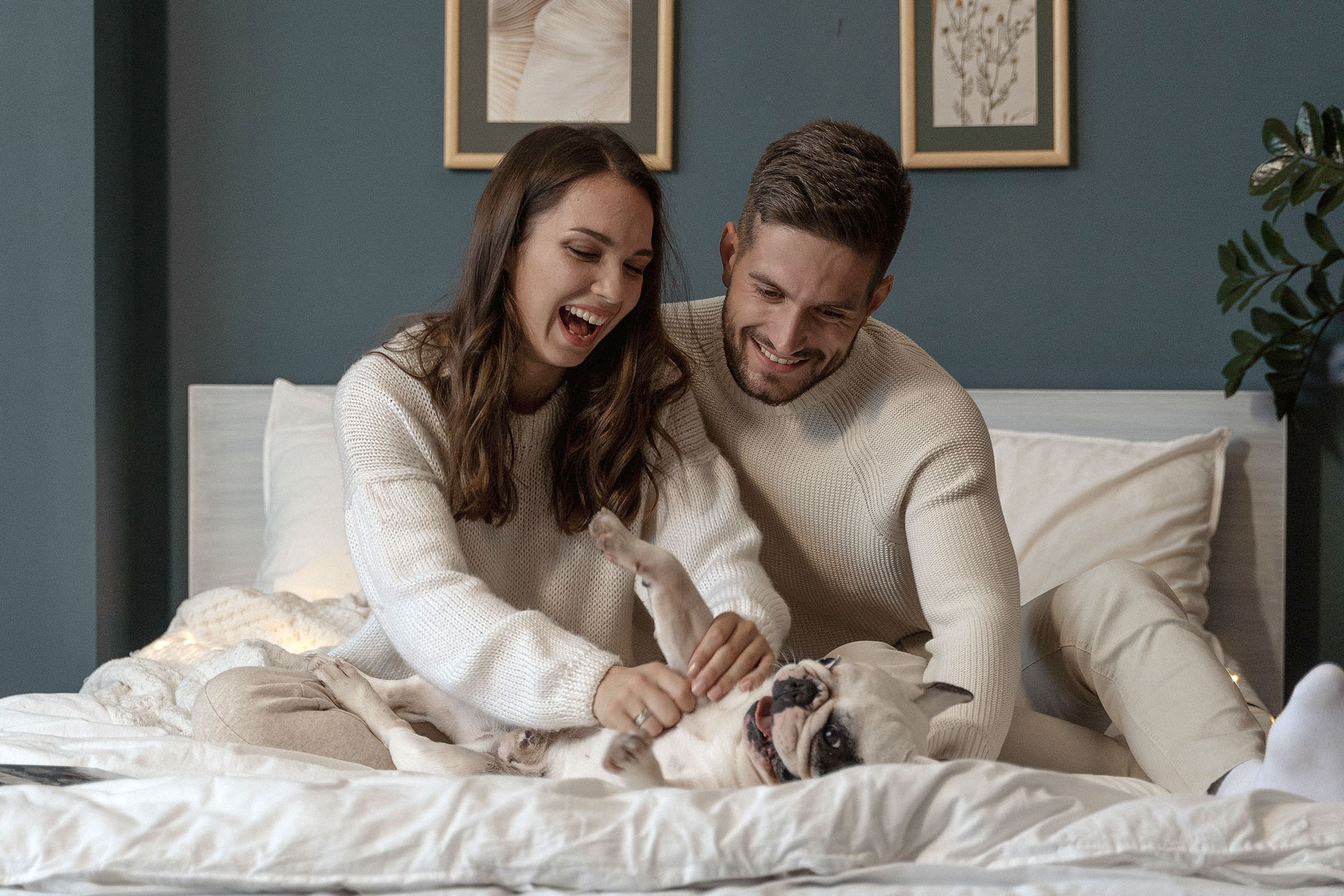
Building a Lifelong Bond
Building a strong and lifelong bond with your French Bulldog is essential for their well-being and your happiness as a pet owner. Here are some tips to foster a deep connection with your Frenchie:
- Spend quality time together:
Make time for regular bonding activities such as cuddling, playing and interactive games. Your Frenchie will appreciate the attention and love. - Positive reinforcement:
Continue to use positive reinforcement in your interactions with your French Bulldog. Reward good behavior and show your affection to strengthen the bond between you and your dog. - Be patient and understanding:
French Bulldogs, like any other breed, can have their quirks and challenges. Be patient and understanding as you deal with their unique personality traits and needs. - Respect boundaries:
Respect your Frenchie’s boundaries and personal space. Allow them to approach new situations and people at their own pace and never force them into uncomfortable situations. - Maintain routine and consistency:
Establish a consistent routine for your French Bulldog, including feeding, exercise and training schedules. Consistency provides a sense of security and helps build trust between you and your Frenchie. - Provide mental stimulation:
Keep your Frenchie’s mind active by mentally stimulating him through training, interactive toys and new experiences. Mental engagement strengthens the bond between you and your dog. - Show unconditional love:
Above all else, shower your French Bulldog with unconditional love. Be a source of comfort, support and companionship, and your dog will reciprocate with unwavering devotion.
If you follow these tips, you will build a lifelong bond full of love, trust and companionship with your French Bulldog.
Conclusion
French Bulldogs are adorable and lovable companions with unique characteristics and grooming needs. By understanding his history, personality and specific care needs, you can give your Frenchie the best life possible. From training and socialization to nutrition and exercise, each aspect of their care contributes to their overall well-being. Remember to put their health first, provide mental and physical stimulation and build a strong bond through love and patience. With the right care and attention, your French Bulldog will bring you many years of joy and happiness.

